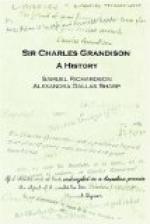At her going away—I will tell you one thing, said she: I never before, in a business which my heart was set upon, was so effectually silenced by a precedent produced by myself in the same conversation. I came with an assurance of success. When our hearts are engaged in a hope, we are apt to think every step we take for the promoting it, reasonable: Our passions, my dear, will evermore run away with our judgment. But, now I think of it, I must, when I say our, make two exceptions; one for you, and one for Sir Charles Grandison.
But, Lucy, tell me—May I, do you think, explain the meaning of the word selfish used by Sir Charles in the conclusion of the library conference at Colnebrook, (and which puzzled me then to make out,) by his disclaiming of selfishness in the conversation with the countess above recited? If I may, what an opening of his heart does that word give in my favour, were he at liberty? Does it not look, my dear, as if his honour checked him, when his love would have prompted him to wish me to preserve my heart disengaged till his return from abroad? Nor let it be said, that it was dishonourable in him to have such a thought, as it was checked and overcome; and as it was succeeded by such an emotion, that he was obliged to depart abruptly from me.—Let me repeat the words—You may not have my letter at hand which relates that affecting address to me; and it is impossible for me, while I have memory, to forget them. He had just concluded his brief history of Clementina—’And now, madam, what can I say?—Honour forbids me!—Yet honour bids me—Yet I cannot be unjust, ungenerous, selfish!’—If I may flatter myself, Lucy, that he did love me when he said this, and that he had a conflict in his noble heart between the love on one side so hopeless, (for I could not forgive him, if he did not love, as well as pity, Clementina,) and on the other not so hopeless, were there to have been no bar between—Shall we not pity him for the arduous struggle? Shall we not see that honour carried it, even in favour of the hopeless against the hopeful, and applaud him the more for being able to overcome? How shall we call virtue by its name, if it be not tried; and if it hath no contest with inclination?
If I am a vain self-flatterer, tell me, chide me, Lucy; but allow me, however, at the same time, this praise, if I can make good my claim to it, that my conquest of my passion is at least as glorious for me, as his is for him, were he to love me ever so well; since I can most sincerely, however painfully, subscribe to the preference which honour, love, compassion, unitedly, give to Clementina.
LETTER XXX
Miss Byron.—In continuation
Monday night.
My cousins and I, by invitation, supped with Lady G—— this evening. Lord and Lady L—— were there; Lady Olivia also, and Lady Maffei.




